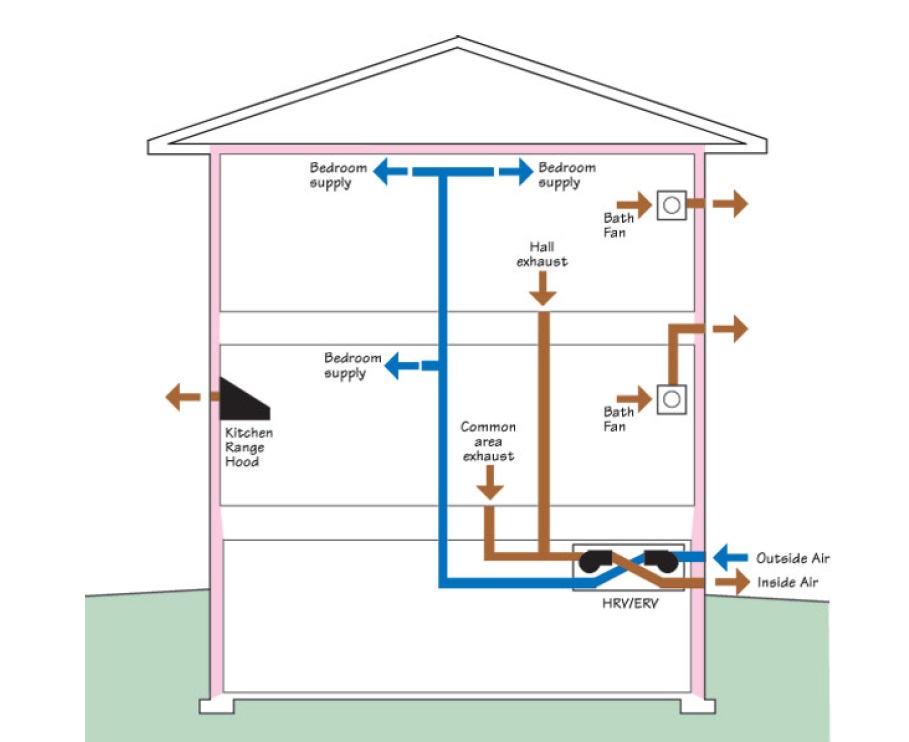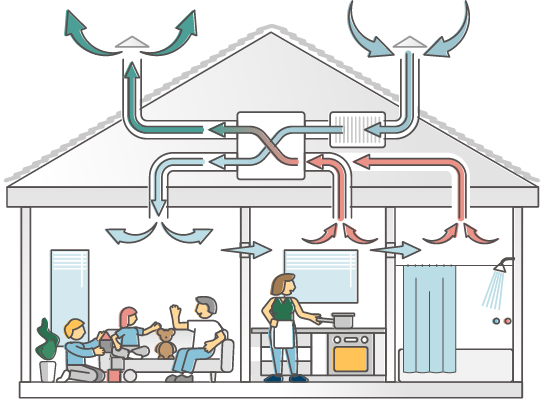The Duty of Home Ventilation in Protecting Against Mold and Indoor Allergens
Home air flow is a critical element in maintaining a healthy and balanced indoor setting. It controls humidity degrees, which can stop the growth of mold and mildew and the accumulation of irritants. Numerous homeowners ignore the importance of correct air flow, frequently leading to undetected problems. Understanding exactly how ventilation systems feature and their influence on air quality might be the trick to a healthier space. What steps can be required to boost these systems efficiently?
Recognizing Home Ventilation Solutions
While many house owners might overlook the significance of air flow, recognizing home air flow systems is important for preserving interior air quality and protecting against mold growth - Home Ventilation Melbourne. These systems help with the exchange of stagnant interior air with fresh exterior air, efficiently decreasing toxins and moisture degrees. Common types include natural ventilation, which depends on wind and temperature level distinctions, and mechanical air flow, which utilizes ducts and fans to control airflow. Furthermore, balanced ventilation systems integrate both approaches to maximize air quality. Correctly designed and maintained ventilation systems can help regulate temperature level and moisture, ensuring a comfortable living environment. Property owners ought to think about elements like home environment, design, and occupancy when selecting a ventilation system to ideal match their requirements and improve total air top quality
The Effect of Humidity on Mold And Mildew Growth
Moisture plays a crucial role in mold and mildew growth, making it a critical aspect for property owners to monitor. Mold thrives in atmospheres where moisture levels go beyond 60%, as these conditions provide the wetness necessary for spores to multiply and germinate. High moisture can result from various resources, including poor ventilation, water leakages, and cooking or showering activities. When moisture degrees stay elevated, mold and mildew can establish swiftly on organic products such as drywall, material, and timber. Property owners should use dehumidifiers and guarantee appropriate ventilation in locations susceptible to wetness, such as basements and restrooms. Preserving interior humidity between 30% and 50% can substantially decrease the threat of mold and mildew growth, adding to a healthier living environment.
Determining Usual Indoor Allergens
Indoor environments can harbor a range of allergens that affect health and wellness and convenience. Usual interior irritants consist of dirt termites, pet dander, mold spores, and pollen. Dust mites prosper in bed linen, carpetings, and upholstery, feeding upon organic material and contributing to breathing problems. Family pet dander, composed of little flakes from skin and fur, can set off allergies in sensitive individuals. Mold and mildew spores, typically existing in damp areas, can proliferate and impact air high quality. Additionally, pollen can infiltrate homes via open windows or on clothing. Identifying these irritants is important for keeping a healthy interior atmosphere. Understanding he said of their existence allows property owners to take proactive measures to decrease exposure and improve overall interior air high quality.
Benefits of Correct Air Flow
Appropriate ventilation is vital for maintaining a healthy and balanced interior setting, as it aids to control air quality and reduce the build-up of contaminants. Adequate air movement facilitates the exchange of indoor and outside air, consequently thinning down unsafe compounds such as volatile natural substances, allergens, and dirt. This procedure not only enhances convenience however also adds to the overall health of passengers by reducing respiratory problems (Home Ventilation Melbourne). Additionally, proper air flow efficiently regulates moisture levels, lowering the likelihood of mold and mildew growth and cultivating a drier atmosphere helpful to health and wellness. Furthermore, it can boost energy efficiency by making sure that cooling and heating systems run a lot more successfully, leading to reduced power expenses. On the whole, appropriate ventilation is an important part in promoting a secure and healthy space

Tips for Improving Home Air Flow
Although many house owners may overlook it, improving home ventilation is crucial for improving air quality and avoiding mold and mildew development. One efficient approach is to routinely open home windows to promote cross-ventilation, allowing fresh air to flow. Setting up exhaust followers in bathrooms and kitchens can successfully get rid of moisture-laden air, decreasing humidity degrees. Homeowners should likewise think about using air cleansers with HEPA filters to capture contaminants and irritants. Regularly preserving heating and cooling systems, including altering filters, warranties peak airflow and performance. Sealing leakages around windows and doors can prevent outdoors air from entering, which assists keep a consistent indoor atmosphere. Including houseplants can naturally enhance air high quality while including aesthetic worth to the home.
Frequently Asked Concerns
Exactly how Commonly Should I Clean My Home Ventilation System?
Determining how commonly to clean a home ventilation system depends on different aspects, including usage and environmental problems. Home Ventilation Melbourne. Generally, professionals recommend a comprehensive cleansing every 3 to 5 years to preserve perfect airflow and effectiveness
Can Plants Help In Reducing Indoor Allergens?
Research study suggests that certain indoor plants might help in reducing irritants by boosting air top quality and raising moisture. Their performance varies, and maintaining a tidy atmosphere remains crucial for taking care of indoor allergens efficiently.
What Kinds Of Air Filters Are Ideal for Mold And Mildew Avoidance?

Exist Details Air Flow Needs for Basements?

Just how Do I Know if My Ventilation Is Working Efficiently?
To determine reliable ventilation, one ought to check humidity levels, examine air movement with vents, and observe indicators of condensation or stationary air. Routine analyses can indicate whether the system effectively circulates and exchanges interior air.
Recognizing exactly how air flow systems function and their impact on air quality can be the trick to a healthier living space. While several house owners might overlook the significance of ventilation, recognizing home ventilation systems is vital for keeping interior air top quality and avoiding mold and mildew growth. Usual kinds consist of natural ventilation, which depends on wind and temperature level differences, and mechanical ventilation, webpage which uses ducts and fans to manage air movement. Proper ventilation is crucial for preserving a healthy and balanced indoor atmosphere, as it assists to regulate air quality and reduce the build-up of contaminants. Numerous home owners might ignore it, enhancing home air flow is important for improving air high quality and stopping mold growth.